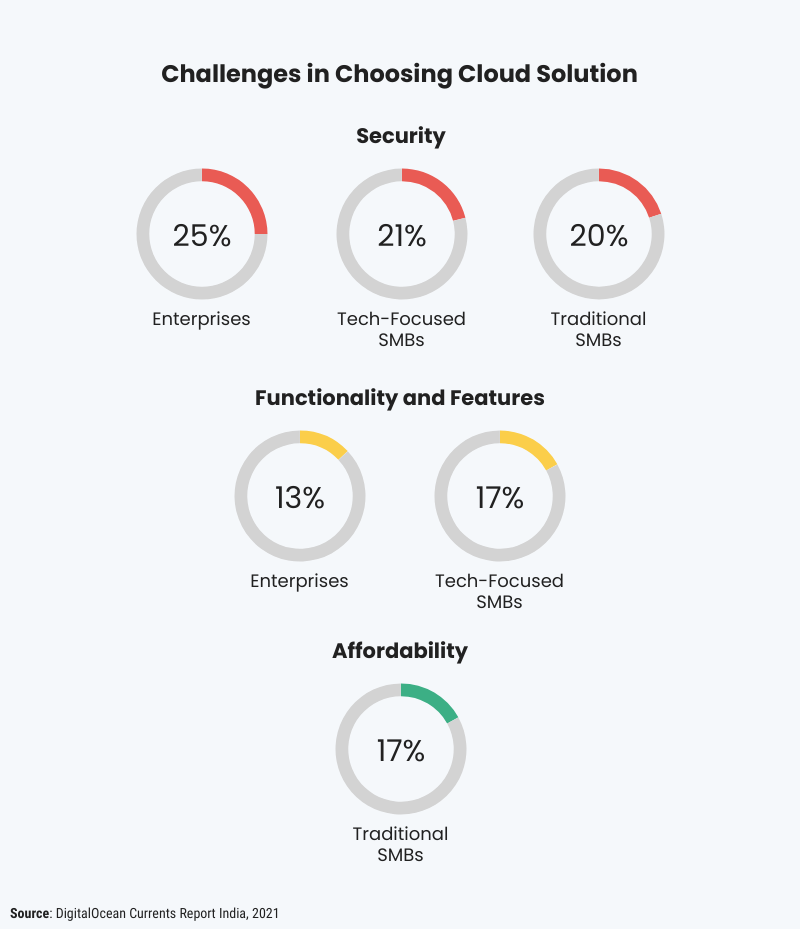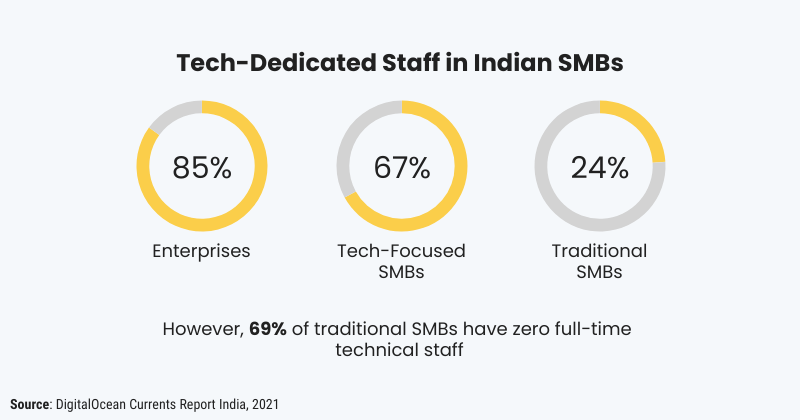Cloud solutions have aided most of the SMBs in recovering from the ravages of COVID-19. Yet the traditional SMBs seem to be the least penetrated by cloud services because of a lack of knowledge regarding their technological aspects and infrastructure.
Small and medium-sized businesses (SMBs) are called the backbone of our economy, accounting for nearly 37 per cent of the total GDP of the country. In order to grow and establish themselves, small businesses irrespective of the sector they belong to, have been rapidly adopting digitisation and are utilising cloud services or solutions for the same.
Meanwhile, the unprecedented turbulence caused by the COVID-19 pandemic has accelerated the adoption of cloud services over the last two years. Moreover, the SMBs face some unique challenges when it comes to running their businesses and selecting the appropriate technology solutions for the same.
DigitalOcean, a cloud provider conducted a survey with over 2,400 IT decision makers in 48 countries to identify these business challenges and analyze the trends regarding SMBs and cloud usage. Let’s dive in to understand a few of their findings.
A little about cloud
Cloud computing is the delivery of on-demand computing services, security services, applications, storage, and other resources that can be accessed with an internet connection through another provider’s shared cloud computing framework.
Cloud computing is an essential tool in today’s business scenario. Cloud solutions not only offer IT infrastructure but also a business framework to the SMBs. Cloud computing is useful for the SMBs in terms of its accessibility, security, flexibility and disaster management aspects and it provides them with cost, time and energy savings as well. The inclination towards ease of doing business has compelled most of the SMBs to employ cloud technology solutions.
According to the survey, the adoption of cloud solutions by SMBs has witnessed exponential growth but the traditional SMBs are still lagging way behind in this race. Some of the challenges are due to the knowledge gap regarding cloud services within the traditional SMBs (non-IT business with less than 500 employees) and the lack of a key person on their staff to handle their cloud operations. Meanwhile, the imperative factor for businesses is to choose cloud services according to their sizes and needs.
Choosing solutions according to business size
The security and features of the solution are the two important factors to consider when selecting a cloud service. Cloud infrastructure security is the most important consideration for all business types, with 25 per cent of the enterprises, 21 per cent of the tech focused SMBs, and 20 per cent of the traditional SMBs citing it as their most important consideration when selecting a cloud infrastructure solution.
The functionality and features of the cloud solution, as well as its reliability, are the next most important considerations, and these are only taken into account by the enterprises and the tech-focused SMBs.

Affordability is also a challenge for the traditional SMBs
Additionally, the traditional SMBs face the obstacle of affordability. The cost of the solution is a top consideration for 17 per cent of the traditional SMBs, putting it on the same tier as security when it comes to them. They look for the other considerations after making sure that the service is affordable.
Different sized businesses need different types of cloud architecture to meet their needs. The tech focused SMBs and enterprises are both more likely than the traditional SMBs to use the multi- or hybrid-cloud models. Additionally, the tech focused SMBs are more likely than the other two groups to consciously choose a multi-cloud environment.
The knowledge gap amongst the traditional SMBs
Traditional SMBs have fewer employees than the other business segments and thus have fewer or no employees dedicated to managing their technology (43 per cent). Hence, these SMBs face the additional challenge of not knowing as much about technology and cloud solutions.
There is also a lower usage of cloud solutions, SaaS and PaaS among the traditional SMBs. Traditional SMBs are not very familiar with the term “cloud-native” and thus are less likely to consider themselves as such, as they use fewer types of cloud services. Just 35 per cent of the traditional SMBs consider themselves a cloud-native business compared to the 58 per cent tech focused SMBs and 64 per cent enterprises, who deem themselves as such.
Cloud computing penetration in India
According to the report findings, in India, 85 per cent of the enterprises (more than 500 employees) have a dedicated team managing their tech infrastructure, while 67 per cent of the tech focused SMBs and only 24 per cent of the traditional SMBs have a technology-dedicated staff member or team. In fact, 69 per cent of the traditional SMBs do not have even one full-time technical staff member.

However, cloud services have been a tremendous help to the businesses struggling with the impacts of the pandemic. Overall, 83 per cent of the enterprises and 69 per cent of the tech focused SMBs believed that cloud services had aided them in their recovery, but only 54 per cent of the traditional SMBs professed the same.
Only 52 per cent of the traditional SMBs considered themselves a cloud-native business compared to the 71 per cent tech focused SMBs and the 86 per cent enterprises that considered themselves as such.
Overall, the report implies that both the traditional SMBs and the tech focused SMBs have specific pain points and unique considerations when it comes to choosing a cloud provider. However, the traditional SMBs need more awareness, know-how and education on how to best utilize the entire gamut of cloud services that are on offer at this point in time.


